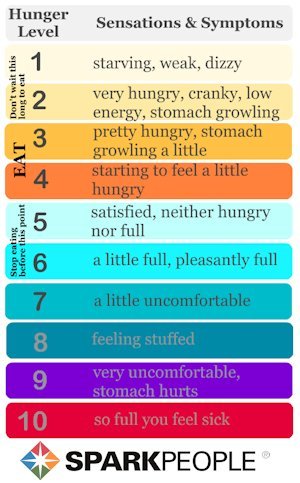|
We all know people who lack good nutrition and fitness habits but have remained thin their whole lives. On the flipside, we know others (sometimes even ourselves) who do everything right and can't catch a break when it comes to weight loss. Scientists don't completely understand why some people seem to never struggle with their weight while others seem to gain weight just by looking at a slice of cake. But we do know that our habits are only one part of the equation along with genetics and environmental factors. So do these "naturally" thin people really have any secrets to offer the rest of us (outside of their coveted DNA)? While thin isn't synonymous with healthy, individuals who are both thin and healthy have a few habits in common. Adopting some or all of these behaviors won't guarantee that you'll reach your ideal weight, but they will definitely improve your health and well-being. 5 Secrets of the Naturally Thin (and Healthy) 1. They eat only until full. Naturally thin people tend to listen to their bodies and eat only when they're truly hungry (rather than bored, sad or tired or just because food is around). They also stop eating when they feel satisfied (not after they've cleaned their plates). While this trait may be innate to the naturally thin, it's also something that can be learned over time. In order to know what being really full feels like, you first need to experience what it really means to be hungry. Look at the hunger chart below. Where do you fall on the chart when you usually eat? The best time to eat is actually when you're at a 3 or 4. If you wait to eat until you're so hungry that you become weak or cranky, you're more likely to choose an unhealthy food option. And if you eat when you're at a 5 or above, it's for the wrong reasons.  2. They get enough sleep. Of course, there are plenty of naturally thin people who suffer from insomnia or always burn the candle at both ends, but sleep is crucial to maintaining a healthy weight. Lack of sleep actually causes the body to release a hormone called cortisol that makes us feel hungrier than normal. And it effects other hormones that make it harder to metabolize carbohydrates, burn fat and build muscle. If you're struggling with getting enough sleep, take a look at your habits and lifestyle to find places to make changes. There are lots of ways to improve the quality of your sleep, including setting a regular bed time, using your bedroom is used only for sleeping (and sex), and managing the stress in your life. Even better, the number one way to improve sleep is also important to weight loss: exercise. 3. They simply move more. Research shows that people who move the most and sit the least--even if they don't take part in structured exercise--tend to weigh less than people who are more sedentary. While fitting regular workouts into your schedule is the most obvious way to burn calories all movement burns calories even if it doesn't count as a workout. So look for opportunities to squeeze more calorie-burning "NEAT" (non-exercise activity thermogenesis) into your day by walking, standing, cleaning and even fidgeting. One Mayo Clinic study that examined the effects of NEAT found that these basic, everyday activities can have a significant effect on an individual's caloric expenditure. The study suggested that including activities like walking meetings and pacing while on the phone can burn an extra 500-1,000 calories a day! 4. They don't "diet." Most people who are naturally thin aren't constantly going on and off new diets. They simply eat food in moderation without yo-yoing betwen extremes of deprivation and uncontrolled bingeing. There are several problems with "going on a diet" that can backfire and actually leave you in a worse position than when you started. Restrictive diets leave us hungry and craving all the "wrong" foods, which often turns into an all-out gorgefest when we simply can't stick it out any longer. Rather than restricting certain foods, make room in your healthy eating plan for all of your favorite foods in moderation. This will help prevent feelings of deprivation, extreme hunger, and resulting binges that can steer you off track. Consistency is key when it comes to managing your weight. 5. They don't drink their calories. Americans drink 400 calories a day on average. The problem with these calories is that many come from sugar and none of them will satsify you as long as real food. Plus it's much easier to mindlessly drink a 600-calorie frozen coffee drink than it is to consume the same amount of calories in the form of real food (like a grilled chicken sandwich and side salad). However, there's no reason not to enjoy a glass of red wine with dinner or a cup of coffee in the morning. Just make sure you track any calories you drink so they can be a part of your regular eating plan rather than an unexpected indulgence. While it's easy to envy people who seem to maintain their weight so effortlessly, we usually don't and can't know whether it's truly just luck or whether they do more than meets the eye to stay that way. Instead of focusing on what your body doesn't do for you, focus on all the healthy choices you make for yourself every day. Whether those choices lead to weight loss or not, they will lead to a longer, better life. Source Levine, JA. "Non-Exercise Activity Thermogenesis," Best Practice & Research Clinical Endocrinology & Metabolism, 2002 Dec;16(4):679-702. |






.png)
